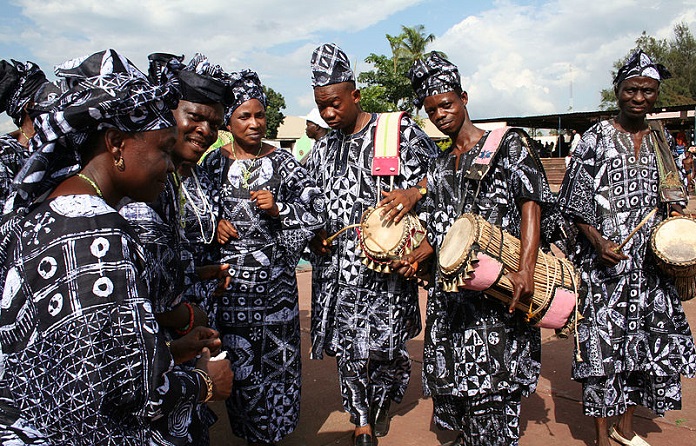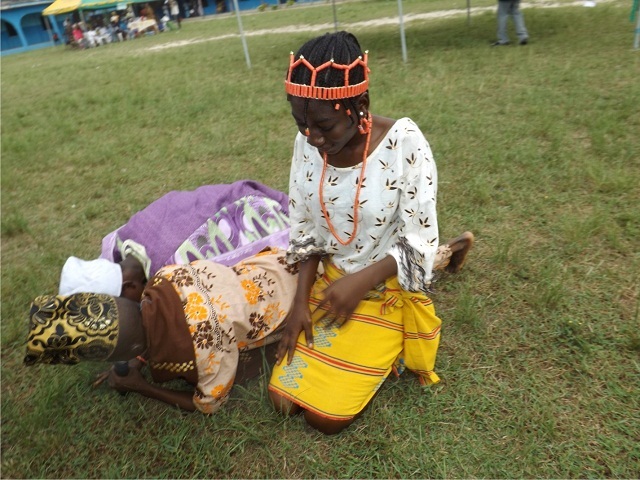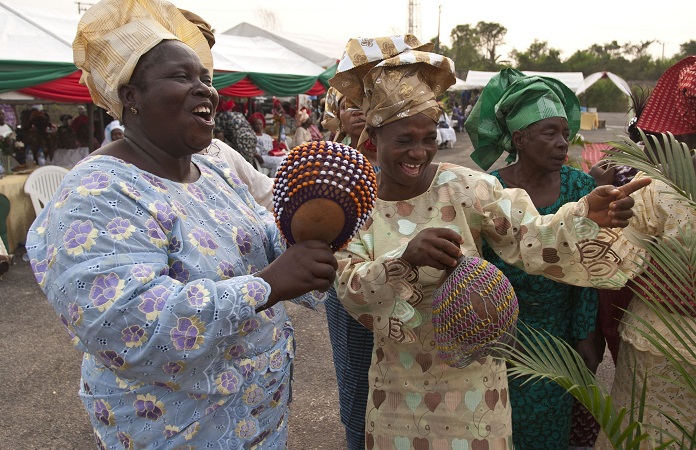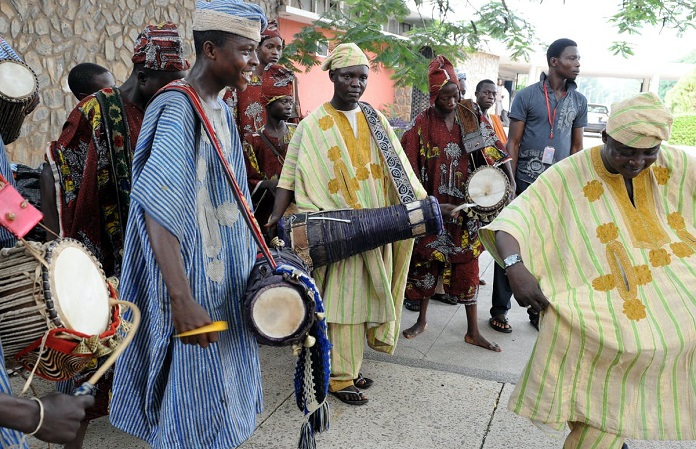The Yoruba language is a language spoken predominantly by people from the southwestern part of Nigeria. It is a member of the Congo-Kordoanian language family and is a tonal language with the highest number of native speakers. The language is prominent among the Yoruba ethnic group, one of the major ethnic groups in Nigeria. It is a vast language that is also spoken in some other Nigerian neighboring countries such as Togo, Gambia, Sierra Leone, Cote De Ivorie. Within Nigeria, it is spoken in different ethnic groups that are not of the Yoruba ethnic group. The language is easily learned, and the article shows the beginner Yoruba words and their meanings in English.
Important Beginner Yoruba Words and Meaning In English
For anyone interested in learning Yoruba as a language, there are major words and phrases that serve as the basic. These words are used constantly, making it very essential for a learner to start learning from there.
Greetings In the Yoruba Language
Like the everyday good morning, good afternoon, and good evening in the English language, the Yoruba language has a way of saying their greetings. Greetings in the Yoruba language are accompanied by lots of respect from the younger to the older ones. It is advised that people who are fresh in learning the beginner Yoruba words should learn these greetings in order not to pass a wrong meaning.
Ẹ káàárọ̀
Ẹ káàárọ̀ means good morning in the Yoruba language. In phonetics, it is pronounced as “Eh-Kah-ah-roh.” There is a lower tune at the end (roh). The word is used from early in the morning till before noon.
To your close friends and those below your age, it is allowed to make use of just “káàárọ̀.” To those above your age, it should remain formal with the “Ẹ” inclusive making it sound complete as in Ẹ káàárọ̀.
- To greet a man in the morning, use Ẹ káàárọ̀ sah.
- To greet a woman in the morning, use Ẹ káàárọ̀ ma.
Ẹ ne lẹ́
The phrase Ẹ n lẹ, when translated to the English language, stands for “hello.” The pronunciation of this is “en-le.” In using this phrase in the Yoruba land, the women kneel while the men prostate if they refer to their elders. To address the elders, the “Ẹ” should be inclusive while addressing your mates, and you can go without the “Ẹ.”
Ẹ káàsán
Ẹ káàsán means a good afternoon in the Yoruba language. Its pronunciation is “Eh-kah-son,” It involves a louder tone while pronouncing the last part of the word “son.” The time for using this word is the same as the usual time for the English “good afternoon,” which is from 12 pm to 5 pm.
It is highly insulting to greet an elder just with káàsán. The “Ẹ” is the respect attribute in the greeting, which shows that the person greeting acknowledges the receiver as an elder. The káàsán is allowed for friends under the same age and to younger people.
- To greet a man in the morning, use Ẹ káàsán sah.
- To greet a woman in the morning, use Ẹ káàsán ma.
Ẹ káalẹ́
Ẹ káalẹ́ means good evening or good night in the Yoruba language. Ẹ káalẹ́ is pronounced as “Eh-kah-leh,” and it demands a louder tone while pronouncing the last part of the word “leh.” The term is used from 6 pm till 11 pm in the night.
The ‘Ẹ’ is as important as explained in the previous examples. káalẹ́ is mainly used for friends and people below your age, while the full Ẹ káalẹ́ is used for older people.
- To greet a man in the morning, use Ẹ káalẹ́ sah.
- To greet a woman in the morning, use Ẹ káalẹ́ ma.
Bidding Goodbye With Beginner Yoruba Words
To bid goodbye in the Yoruba language can come in several ways. Below is a way in which you can use the beginner Yoruba words to bid goodbye.
Ó dáàrọ̀
The Ó dáàrọ̀ Yoruba phrase means “Goodnight” and should be used in the evening when one is about to go to bed. Ó dáàrọ̀ can be pronounced as “Oh-dah-roh” with your voice raising at the “oh” and dropping at the roh.”
Ó dàbọ̀
Ó dàbọ̀ means goodbye in the English language and is used just like the way you use the English goodbyes. Ó dàbọ̀ can be pronounced phonetically as “Oh-dah-boh” with a high pitch when pronouncing the “oh” and a lower one when pronouncing “dah-boh.”
Introductions With The Beginner Yoruba Words
Introductions in the Yoruba language help one in proper explanation of oneself. This will help a learner to give an appropriate introduction themselves to a core Yoruba person.
Orúkọ mi ni
The meaning of the Yoruba phrase “Orúkọ mi ni” is “my name is.” To complete the sentence, your name will follow. The pronunciation is “oh-roo-koh me knee.” There is a louder tone on voicing “roo.” It won’t be easy to guess if you are learning the language with the proper pronunciation, as it will fit properly. For Example, Orúkọ mi ni Stanley (meaning; My name is Stanley)
Kí l’orúkọ ẹ?
Kí l’orúkọ ẹ means ‘what is your name?’ in the Yoruba language. The Yoruba language is used to a lot of contractions. The phrase its original full version should be “kí ni orúkọ rẹ,” but was switched to “Kí l’orúkọ ẹ” having it that the “ni” and “o” are joined together to give “l’o” also “r” entirely removed from the phrase leaving “ẹ.” A learner should know this fundamental question to blend well in an introduction.
To Ask How Someone is in the Yoruba Language
Asking how someone is in all languages, not only the Yoruba language, creates an enabling environment for good conversation. The questions in this section are daily conversation questions and are very important for a learner.
Ṣé àlàáfíà lẹ wà?
Ṣé àlàáfíà lẹ wà means, How are you in the Yoruba language. It is a humble and formal way of asking someone older age, “How are you.” The associated response to the question “Ṣé àlàáfíà lẹ wà?” should be “àlàáfíà ni.”
- To ask your father how he is, you can make use of “Ṣé àlàáfíà lẹ wà sah?”.
- To ask your mother how she is, you can make use of “Ṣé àlàáfíà lẹ wà ma?”.
Ṣé dáadáa ni?
Ṣé dáadáa ni is also used for How are you? in the Yoruba language. “Ṣé dáadáa ni” can also be used to represent Are you alright? And the accompanying response remains “dáadáa ni,” which means I am good. In some cases, “Ṣé dáadáa ni” can mean “you alright yeah?” and the response remains “dáadáa ni” or “adúpẹ́.”
It will also profit a learner to know that dáadáa is a reduced form of ‘dáradára.’ Whether you make use of ‘dáradára ni’ or dáadáa ni, it all refers to the same meaning.
The pronunciation of this phrase “ṣé dáadáa ni” is “shay daah-daah knee” if correctly pronounced and the “ah” sound stretched you get the sound ideally. Adúpẹ́ is pronounced as “ah-doo-peh.”
Báwo ni?
Báwo ni? is another way of asking “How are you”? in the Yoruba language. It is an informal way of asking, How are you? Mainly used with close friends who are of the same age as you. Sometimes it can be reduced from “Báwo ni” to “Báwo.” The usual response to the question “Báwo ni” is “dáadáa ni.”
The phrase is pronounced phonetically as “BAH-Woah knee” the first word “BAH” should have a strong push.
To Express What You Want and What You Don’t Want With Beginner Yoruba Words
The beginner Yoruba words below will help you get the knowledge of how to place a demand of what you want and what you don’t want in the Yoruba language.
Mo fẹ́
Mo fẹ́ in English means I Want. To place a demand, add what you want after the phrase Mo fẹ́ to pass an understandable demand in the Yoruba language. Below are examples of a sentence using the words:
- Mo fẹ́ pencil.
- Mo fẹ́ mobile phone.
In placing demands using the Yoruba Language, you have to add a plea to your request to show respect and make your request look less authoritative. To do this, you are to add ‘Ẹ Jọ̀ọ́’ at the beginning of the phrase, which means “please.” Examples are below:
- Ẹ Jọ̀ọ́ mo fẹ́ pencil.
- Ẹ Jọ̀ọ́ mo fẹ́ mobile phone.
To have a clear pronunciation of the phrase Mo fẹ́ follow this phonetic sound “Mow feh” and the end part “fẹ́” should sound louder.
Mo Ní Láti
In the Yoruba language, “Mo ní láti” means “I have to” when it is translated to the English language. Examples of sentences with the phrase “Mo ní láti.”
- Mo ní láti swim.
- Mo ní láti jump.
The pronunciation of this phrase “Mo ní láti” is “Mow knee lah-tea,” and you must apply a higher tone while pronouncing “knee” and “lah” words from the phrase.
Mi Ò Fẹ́ràn
The Yoruba phrase mi Ò fẹ́ràn means “I don like or I don’t love” in the English language. To use the term, add whatever you wish to express your dislike at the end of the sentence. For instance:
- Mi Ò fẹ́ràn milk means I don’t like milk.
- Mi Ò fẹ́ràn eba means I don’t like garri.
- Mi Ò fẹ́ràn dodo means I don’t like fried plantain.
The pronunciation of the Yoruba phrase Mi Ò fẹ́ràn is “me oh feh-ran” raising your voice at the “feh” and dropping it at the “ran.”
For Requests, Appreciation, Response, and Apology in the Yoruba Language
To place a request in the Yoruba Language, it must be accompanied by words that show respect, as respect is part of the culture and lifestyle of the Yoruba ethnic group. Below is a look at some beginner Yoruba words for request, response, appreciation, apology, and some respectful words that accompany requests.
Ẹ Jọ̀ọ́
Ẹ Jọ̀ọ́ means Please in the Yoruba language. It comes before a request or demand. “Ẹ jọ̀ọ́” is the short form of “Ẹ jọ̀wọ́.” The clear pronunciation of this word Ẹ jọ̀ọ́ is “Eh-joh.” Example of sentences that comes with the phrase:
- Ẹ jọ̀ọ́ mo fẹ́ mobile phone, which means Please I want a mobile phone.
- Ẹ jọ̀ọ́ Ẹ má bínú meaning Please, don’t be angry.
Ẹ Má Bínú
This phrase Ẹ Má Bínú means “don’t be angry” in the English language. One can also use it to represent ‘Sorry” in the Yoruba language.” Ẹ má bínú” is mainly used to express apology. “Ẹ má bínú” is pronounced phonetically as “Eh Mah Bee-New.”
Ẹ ṣé
In the Yoruba language, Ẹ ṣé means “Thank You.” In most expressions in Yoruba language, Ẹ ṣé is accompanied by “gan an” which gives a complete expression of “Ẹ ṣé gan an,” which means “Thank You Very Much.” It makes an absolute sense to use Ẹ ṣé but is much better with Ẹ ṣé gan an.
The pronunciation of the word “Ẹ ṣé” is expressed as “Eh shay” with a higher pitch while pronouncing “shay”; likewise, the pronunciation of “Ẹ ṣé gan an” as “Eh shay gone.” The word takes an informal shape when you are thanking friends of the same age or below; the term can be expressed as ṣé o, thereby removing the “Ẹ.”
Bẹ́ẹ̀ Ni
In the Yoruba language, Bẹ́ẹ̀ ni means “Yes” when it is translated to English. It is used mainly as a response in the Yoruba language. Pronunciation of the word Bẹ́ẹ̀ ni is “Beh-eh knee.” There is stress joining the ẹ́ẹ̀ in pronouncing Bẹ́ẹ̀ ni. Example of the phrase in response:
- Bẹ́ẹ̀ ni ma means Yes ma in the English language.
Rárá
Rárá is an everyday word in the Yoruba language. It can be translated to mean “No” in some cases can mean “Not at all.” To pronounce this word correctly, you have to be fast. “Rárá” is pronounced as “rah-rah” and is appropriately used in any response that demands no as an answer.
Bóyá
In the Yoruba language, Bóyá means “Maybe” when translated to the English Language. It takes the responding position in a Yoruba statement. Bóyá can also mean whether, either, if, perhaps, probably, instead, probability, neither. To pronounce Bóyá in the Yoruba language takes a stern tone for the whole word. For better understanding, bóyá is pronounced as “boy-yah.”
To Ask where Something is in the Yoruba Language
Níbo ni…wà?
The Yoruba phrase Níbo ni…wà? Means Where is the…? when translated to the English language. The space before “wà” is intended for the object one is looking for. To gain a proper pronunciation of this phrase Níbo ni…wà?, one has to pronounce it this way “Knee-bow knee…wah”. The accent starts with a stern tone on the “Knee” and reduces when you pronounce “wah.” Example.
- Níbo ni church wà?, which means Where is the church?
- Níbo ni car wà? Meaning, where is the car?
To Enquire on How Someone Is With the Beginner Yoruba Words
Ìwọ ńkọ́?
In the Yoruba language, this means ‘How about you’ or ‘What about you.’ Example of where this phrase fits best in a sentence:
I will want sugar in my tea, ìwọ ńkọ́?
The phrase ìwọ ńkọ́ is pronounced as “ee-woh nn-koh” in this pronunciation, the “nn” sound is pronounced from the nose with a louder tone.
Ó wà/ O n ni
This means in the Yoruba language, “he is” in the English language. To say “he is okay” in the Yoruba language is “Ó wà o dara.” It is mainly used in response to questions about a male. example
- How is your brother? Ó wà o dara.
- For female folks, we make use of “O n ni o dara” as a response.
- How is your sister? O n ni o dara.
Ó wà is not used for an older person like your uncle or dad. To pronounce the word ‘Ó Wà’ in the Yoruba language, a learner should consider “oh-wah” the “ó” takes a louder tone while there is a lower tone on “wa.”
Giving Instructions With The Beginner Yoruba Words
Dúró
Dúró means “Wait or Stop” in the English language. The pronunciation of this word dúró is “do-row,” having a raised voice pronouncing the word “row.”
Jókòó
In the Yoruba language, Jókòó means “Sit.” To respectfully demand an older person to sit, make use of Ẹ jókòó. To tell a younger person to sit, make use of Jókòó. In pronunciation, Jókòó is pronounced as “Joe-ko” sound from “Joe” has to rhyme with that of the “Ko.”
Wá
Wá means in the Yoruba language, “Come.” The word comes repetitively, like “Wá wá wá.” The word Wá is pronounced as “Wah,” with the pronunciation taking a louder tone.
Mo Ti Gbọ́
The translation of the Yoruba phrase, Mo Ti Gbọ́, means several things like “I understand, understood, I have heard.” This serves as an answer to “So ti gbọ́?”. Mo Ti Gbọ́ can be pronounced as “mow tea gboh” with a high pitch and stress at the “gboh.”
So Ti Gbọ́
The phrase So ti gbọ́? It is a question which means “Do you understand? have you heard? Do you get what I mean?” This question is what brings about the answer “mo ti gbọ́.” So ti gbọ́? is pronounced as “show tea gboh?” with the “gboh” pronounced with a high pitch and stress.
How the Yoruba People And Their Language Come About
Yoruba is one of the most popular ethnic groups found around West Africa and can be traced down to Nigeria, Benin Republic, and Togo. These people are over 38 million widespread all over Africa and very few thousand outside the boundaries of Africa. In Nigeria, the Yorubas make up 15.5% of the entire population of the country. The Yoruba language is a language scattered almost around the country. Despite being mainly spoken in the southwestern part of the country, there are traces of the language in some other minor languages located in the country. The Yoruba language is divided into two linguistic sectors: Igala and Edekiri, which have traces of minor languages with segments of the Yoruba language in their dialect.
Igala Language
The segment is further divided into two parts of Eastern Yoruboid. It is observed that the Igala people are located in the Eastern part of Kogi State, Dekina, Ankpa, Idah, Ibaji, Omala, and Igalamela-Odolu, which is the first segment. 2.1 million natives have a trace of divergent Yoruboid language, which is the earliest split and also a trace of Easternmost Yoruboid language in Northwestern Anambra.
The other part of the segment is known as Ogugu, which is also around the Eastern part of Kogi State (Olamaboro) and Northern Enugu State (Uzo-Uwani, Igbo Eze North, Nsukka Local Government). More than 160,000 Nigerians speaking divergent Igala dialect has a major trace of Yoruba languages in their dialects.
Edekiri Language
The segment is also divided into three subsections. The first subsector is the Itsekiri people in the Western Delta State, including Warri South, Warri North, Warri southwest, Sapele, Ethiope West, and Ikpoba Okha, Ovia South-West in Edo State. More than 700,000 people in these areas are traced with Yoruba dialects mixed with the easternmost Edekiri dialect. The Olukumi, a subsegment of the Yoruba Edekiri language, is known today with Isolated Igboid languages in Aniocha North Delta State. About 17,000 are traced with an isolated Yoruba dialect. The core Yoruba in the South West, North Central, and Mid-Western parts of Nigeria include Ondo, Edo, Kwara, Ekiti, Lagos, Ogun, Kogi, Oyo, Osun, and down to the East & Central Benin, Plateau, Collines, Oueme, Zou, Borgu. About 50 million people speak the core Yoruba language.
A Unique Part of The Yoruba Culture That Beginners Should Know
Yoruba is one of the major ethnic groups in Nigeria that has a core value for culture. Some of these cultures are so evident immediately you come across a Yoruba person, while others are implied and challenging to be observed by visitors. These implied cultures cut across the six central Yoruba states of the country, which are Osun, Lagos, Oyo, Ondo, Ogun, and Ekiti. It is vital that visitors have prior knowledge of these cultures to have a smooth blend with the Yoruba people.
High Respect For The Elderly Ones
Respect is one of the highest traditions of the Yorubas that strengthens peace and unity in a society. In Yoruba land, the younger ones are to show great respect to the older ones in greetings and how they address them, using the proper phrases where necessary.
In the Yoruba ethnic group, the younger females are to kneel while greeting, while the younger males are to prostrate while greeting their elders. This is not only done between the younger ones and their elders but also among their peers.
In the Yoruba ethnic group, when a younger one is addressing an older one, they are to use “e” when addressing the elders and “o” when addressing their peers.
Handing Over Items to Elders Using the Left Hand
The Yoruba ethnic group sees the use of the left hand as a disrespectful act, which can even lead to total rejection of the item by the elder. Cultures are upheld mainly by the elderly ones from the Yoruba ethnic group. So as a stranger, avoid handing over an item with the use of your left hand in order not to get embarrassed.
According Respect To Names
In the Yoruba culture, names are like spirits, and it takes a lot of research by parents before they give out names to their children. Before a child is named, the following items must be present kola, honey, bitter kola, alligator pepper known as atare, palm oil, water, sugar cane, sugar, salt, and a strong liquor or a gin. All the articles mentioned above have a vital significance in the ceremonial naming culture of the Yorubas. The child, after being named, gets gifts from friends and family.
Another significant culture behind names in Yoruba is that a junior cannot call elders by their terms. The junior should address elders using prefixes like uncle, aunt, brother, or sister. A stranger may receive the insult of a lifetime if they fall victim to this.
Musical Culture of the Yoruba Ethnic Group
The music in the Yoruba culture is like what air is to life. The Yoruba ethnic group of Nigeria uses saworo, beta, sekere, gangan, and others to make good cultural music. Music in the Yoruba land goes with good dancing uniforms with dancers decorated in different colorful attires. The hiding part of every core Yoruba cultural music is always pointing to a story or event. They don’t just play instruments for entertainment, and it has a background storyline left for the Yoruba people to understand.



